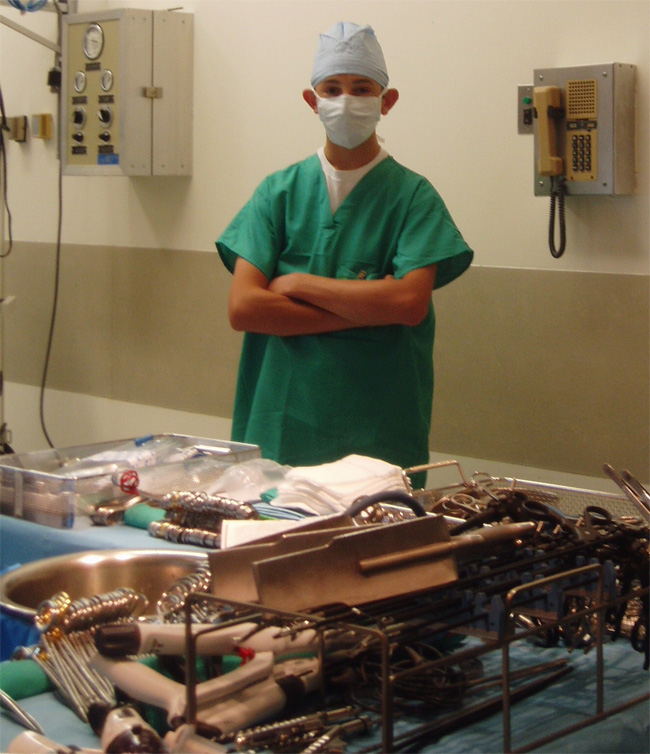The United States is expected to face an estimated shortage of 124,000 physicians by 2025, according to the Association of American Medical Colleges.* Programs such as the College of Medicine's Mini-Medical School have become an increasingly popular way to encourage high school students to consider careers in medicine, with 70 such programs in existence nationwide. However, little research has been done to assess the long-term effect of these programs on influencing career choice.

This 2006 Mini-Med participant, shown ready for the OR, is now in his first year as a surgery resident.
A group of Drexel medical students, residents and faculty have conducted a study to determine the motivational factors for attending the Mini-Medical school programs at the College, student satisfaction with their experience, and whether the programs are successful at encouraging students to pursue a career in the medical field. The study, "Mini-Medical School Programs' Influence on Students' Desire to Pursue Medicine," is being published in the Journal of the National Medical Association (paper available online July 1, 2016). This is the first known research of this nature.
The College's research group included Angela Chang, third-year medical student; Drs. Garrett Cavanaugh and Neil S. Kumar, Drexel/Hahnemann orthopedic surgery residents; Margaret Lee, founding program coordinator for the Drexel Mini-Medical School and related programs; David Stein, MD, chair of surgery at Drexel; and Mary K. Mulcahey, MD, associate professor of orthopedic surgery.
A survey was sent to 228 students who graduated from the College's Mini-Med Summer Camp and Discovery Days program from the program's inception in 2006 through the summer of 2013. Fifty-eight students completed the survey, which was sent through an anonymous online program.
According to the study, nearly all participants said that "confirming an interest in medicine" was a primary reason for attending the Mini-Medical School program. Almost all of the College's program graduates felt their experience answered questions about pursuing a medical career and said they would participate in the program again. The survey results also indicated that participation was influenced by the prestige of the College's program and the notion that the students' chances of being accepted into medical school might be enhanced. The researchers believe that this emphasizes another valuable aspect of Mini-Medical School programs: "educating and preparing students for the competitiveness of applying to medical school."
The study's long-term data on student career paths showed that the College's Mini-Medical School programs "successfully produce a large number of students who go on to pursue a medical career," according to the researchers. Overall, 67 percent of the survey participants reported that they were either in medical school or planned to apply to medical school within the next three years. In their paper, the researchers reported that one of the most "compelling findings" was that 97 percent of the students in medical school or planning to apply indicated that the College's Mini-Medical School programs influenced their decision.
"This study demonstrates that the College of Medicine's Mini-Medical School programs serve an important role in nurturing student interest in medicine and may help those students confirm their career choice," the researchers wrote. "Studying programs like these in more detail may allow us to improve upon these programs and promote success in achieving their ultimate goal of creating more future physicians."
* Dill, M.J., and Salsberg, E.S. The Complexities of Physician Supply and Demand: Projections Through 2025. Center for Workforce Studies, Association of American Medical Colleges; November 2008.